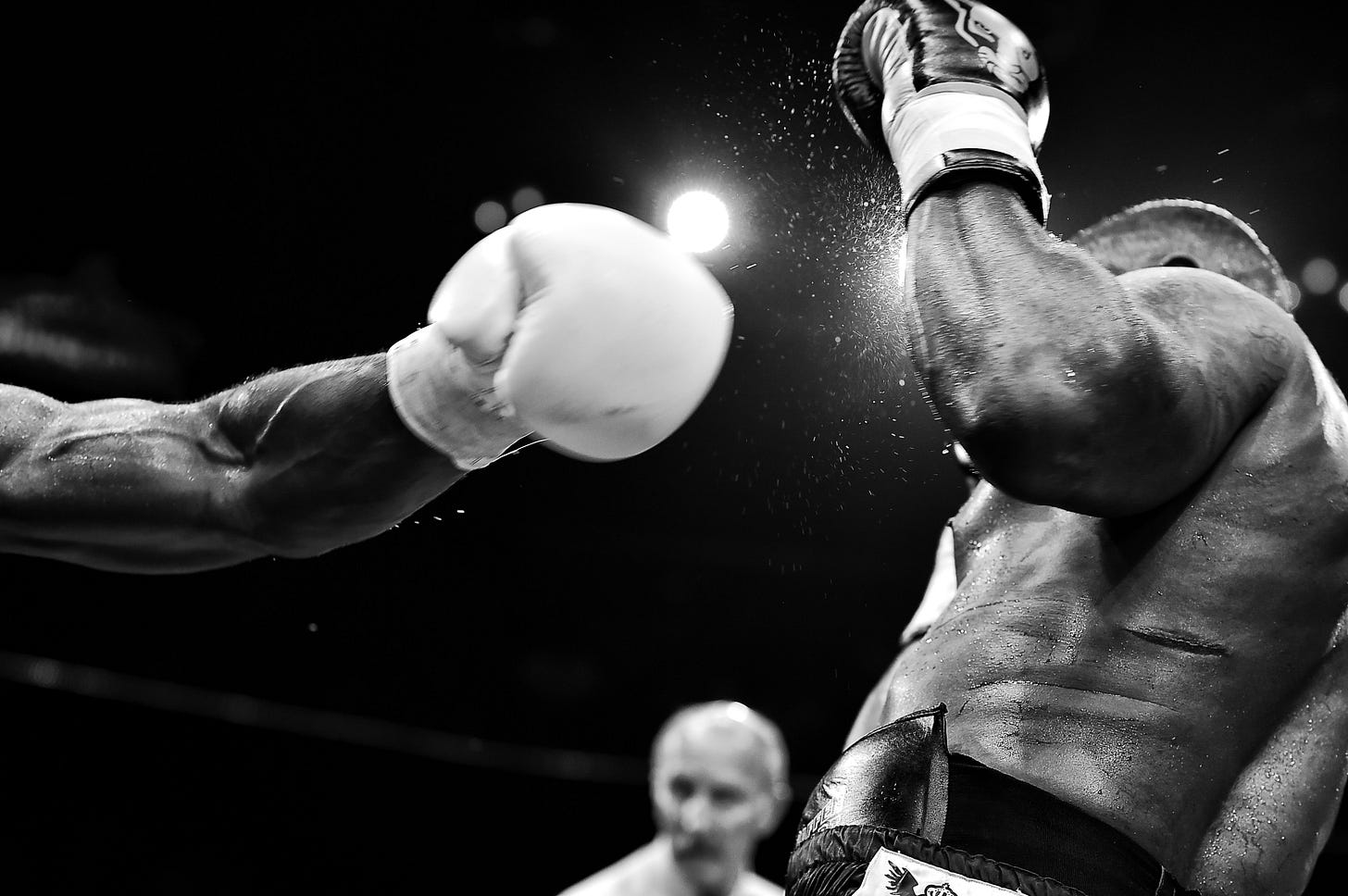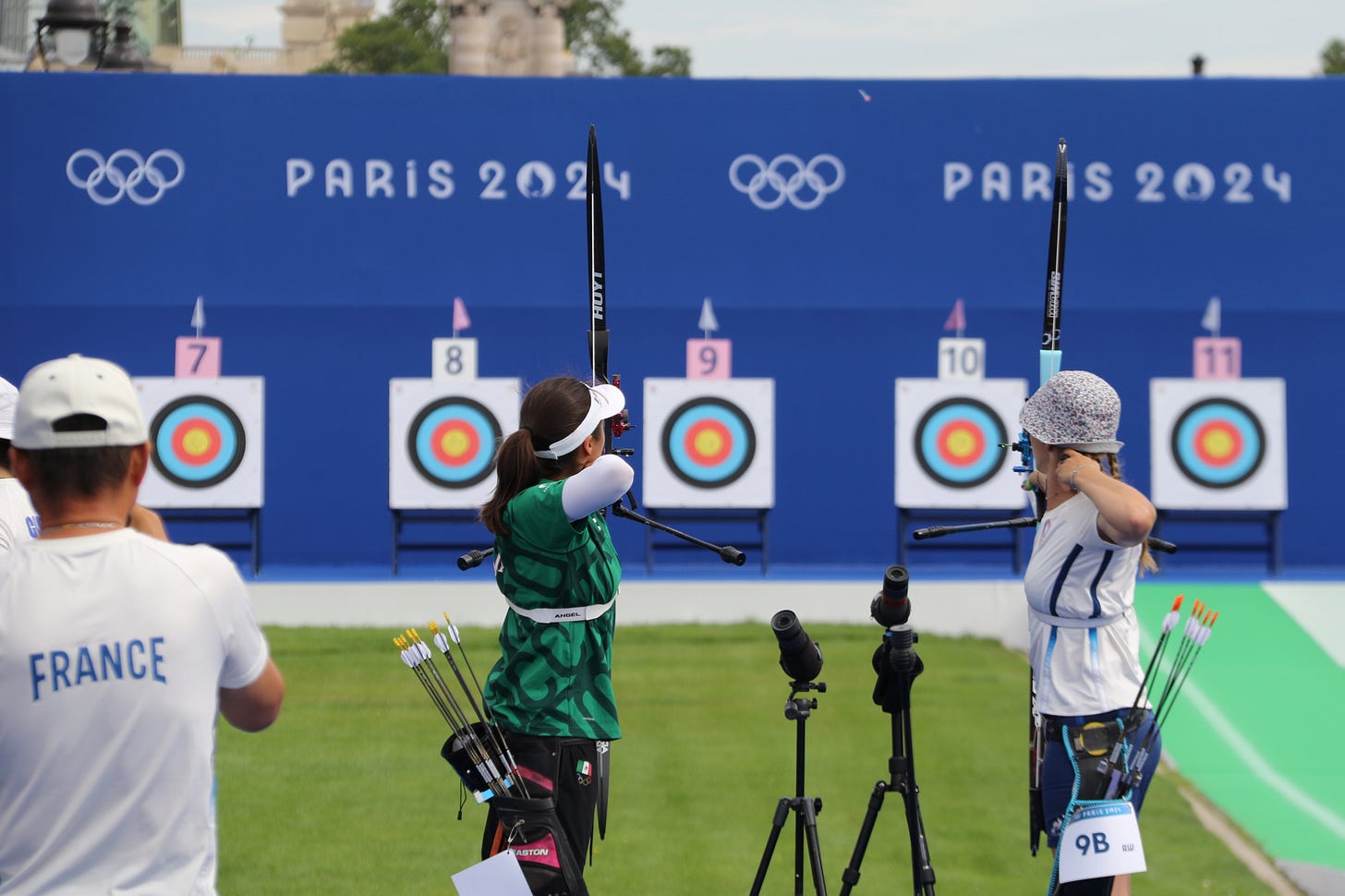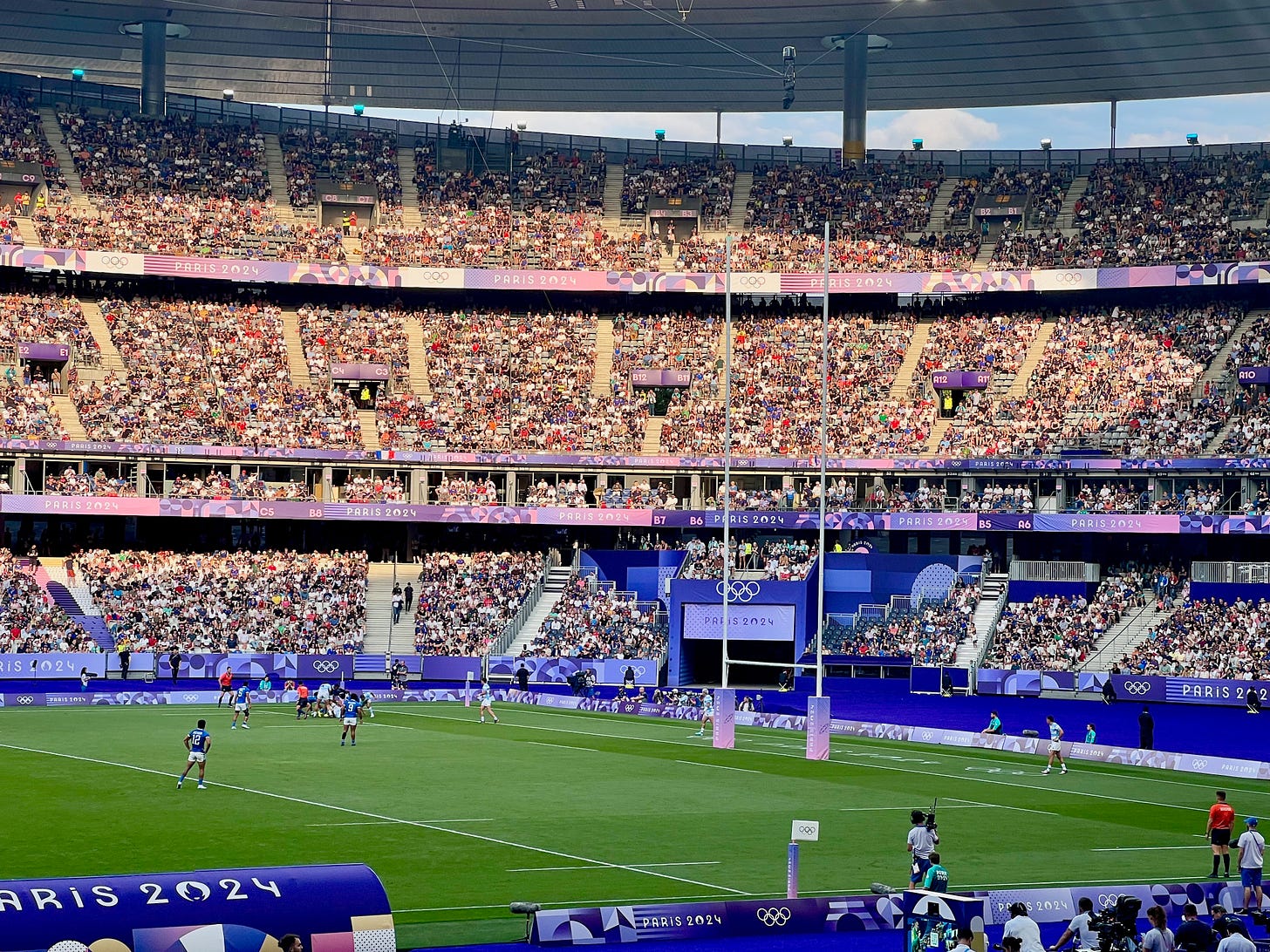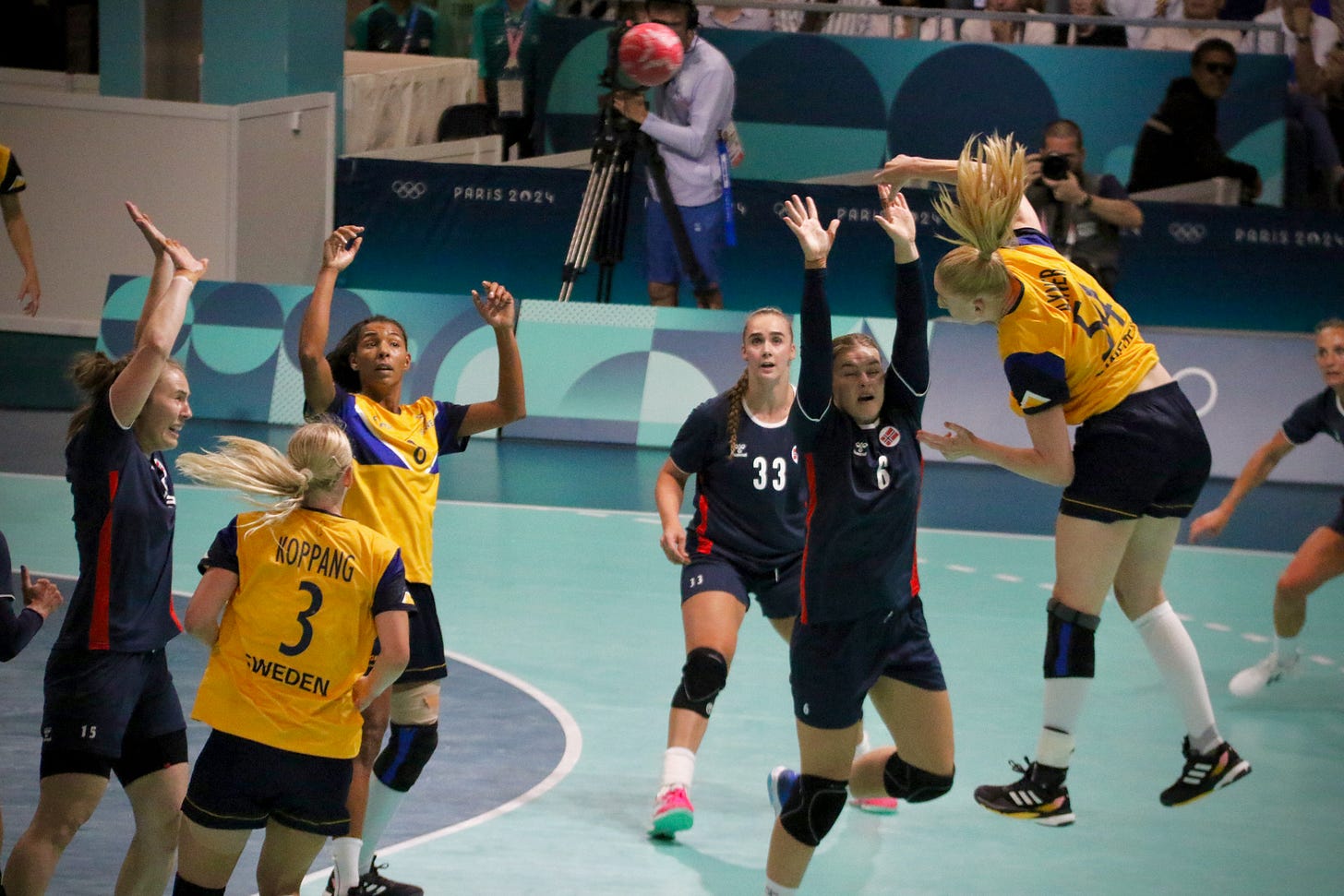Do we punch above our weight? 🥊
Top Three @ The Paris 2024 Olympics
27th July 2024 - Part 3

This is the third instalment in a series of indeterminate length:
Do we punch above our weight?
More coming soon!
Light heavyweight
Following a meeting with New Zealand’s Prime Minister Chris Luxon in Washington DC recently, the United States Deputy Secretary of State Kurt Campbell concluded his statement with this line:
“As a trusted Indo-Pacific partner, New Zealand continues to punch above its weight.”
Source: U.S. Department of State
This is great diplomacy from Kurt. He clearly knows the right buttons to push. There is nothing New Zealanders love more than punching above our weight.
Later today here in Paris things officially get underway. It’s Day 1 and the first gold medals will be handed out (in order):
Shooting - 10m Air Rifle Mixed Teams
Diving - Women’s 3m Synchronised Springboard
Cycling - Men’s and Women’s Individual Time Trial
Judo - Women’s under 48kg and Men’s under 60kg
Skateboarding - Men’s Street
Rugby Sevens - Men’s
Fencing - Women’s Épeé and Men’s Sabre
Swimming - Men’s and Women’s 400m freestyle, Men’s and’s Women’s 4x100m freestyle relay
There will be no medal for the New Zealand men’s sevens team - for the second time in 12 months South Africa were the victor when it mattered at Stade de France on Thursday. It’s a cruel quirk of the scheduling to be eliminated from medal contention on Day -1, even before the Opening Ceremony. But let’s not dwell on that.
In any case, the bigger story today should be Erika Fairweather’s tilt at the 400m freestyle - one of the marquee events of these Olympic Games. She is one of four swimmers who will likely contest the medals. The difficult part for her is that the other three are all current or former world record holders. We’ll be watching with fingers crossed.
Meanwhile, back in New Zealand, the other dozen gold medal events on that list will likely be overlooked entirely.
Before any of those results are known, let’s talk about how we rank performances at an Olympic Games…
Medal tables are bullshit
To recap from Part 1 and Part 2, the New Zealand team at Paris 2024 includes 195 athletes, who will between them contest 101 different events in 23 sports (out of the 329 events across 32 sports that make up these particular Olympic Games).
Every one of these events is a discrete competition. The winners receive a gold medal, and the second and third placed athlete or team get silver and bronze medals respectively. The winners of the 10m Air Rifle in shooting get a gold medal, just like the winners of the rugby sevens and 400m freestyle. It’s complicated. Some events are more objective and more competitive than others. Some of them get significantly more coverage than others. There are many more medals to be won in some sports than others. And yet, the dumb way we generally measure success is a medal table that ranks athletes from each country based on the total number of medals they have won across all of these different events combined.
At an Olympics, the only meaningful result is the winner in each specific event. Anything more than that quickly becomes statistics for statistics’ sake.
We can count the medals won in a specific sport - e.g. “Luuka Jones won the silver medal in the Women’s K1 canoe slalom event at Rio 2016” - but we need to be careful when comparing performances in different Olympics, because the events that are contested change. In Paris 2024 Luuka will compete in a brand new canoe slalom event - the “cross” which, relevant to New Zealand’s overall medal table prospects, has replaced the Women’s K1 200m canoe sprint event won by Lisa Carrington at each of the previous three Olympics.
We can count the medals won by a specific athlete - e.g. “Mark Todd and his horse Chrisma won consecutive gold medals in equestrian three-day eventing in 1984 and 1988” - but we need to be careful when comparing performances by different athletes, not least because of the wildly different number of medals awarded in different sports. It’s no coincidence that the Olympians with the most medals tend to be swimmers - e.g. Michael Phelps won the 200m individual medley gold medal in four consecutive Olympics but has 28 medals in total. 12 of his 28 medals were won in relay events - he benefits by competing in a sport that awards so many medals and also representing the USA, where there is a lot of depth to fill out the relay teams.
We can count the medals won by athletes from a specific National Olympic Committee1 - e.g. “At Tokyo 2020 athletes from New Zealand won 20 medals, including seven gold, six silver and seven bronze” - but we need to be especially careful when we’re aggregating individual performances and comparing those results to other teams or previous Olympics. That’s mostly meaningless.
The correct measure of performance is probably to calculate the conversion rate from events entered to medals won, but even then we need to be careful…
There are many athletics world records set in the 1980s that still stand today - for example Jürgen Schult from East Germany set the Men’s Discus record in 1986 + Florence Griffith Joyner from the USA set the Women’s 100m + 200m records at the US Olympic trials and the following Seoul Olympic Games in 1988.2
Likewise the Los Angeles 1984 Olympics were statistically the most successful Olympic Games ever for athletes from New Zealand. We won eight gold medals - one more than in Tokyo. It was a much smaller team (130 athletes in LA vs 212 athletes in Tokyo) and they competed in fewer events (76 in LA vs 88 in Tokyo), so had a higher conversion rate from events entered to gold medals won. But there was also a boycott by the Soviet Union and other Eastern Bloc countries, including many of the countries who traditionally dominate the canoe sprint events, where New Zealand won five of the eight gold medals, which means there will always be an asterisk next to that result. While it’s true that you can only compete against those who turn up, it does highlight the difficulty of comparing results from different events and across different Olympics.
We’re just a small country at the bottom of the world
There is a particular flavour of medal table that New Zealanders are especially fond of: medals per capita.3 When I say a medal table is mostly meaningless, this sort order takes it to a whole new level. The obvious reason why we love this obscure measure of success is it tends to flatter us - unlike other smaller countries we usually win a handful of medals (the numerator) and there are not many of us (the denominator).
However, before we brag about punching above our weight, we should ask ourselves whether the thing we’re competing in actually has weight divisions. And consider what happens to underweight fighters taking on bigger opponents, most of the time. Maybe we’re not competing in the wrong weight class, maybe we were just dehydrated prior to weigh-in?
Of course, the reality is at an Olympic Games there are no weight divisions (at least not on the medal table). Each event has one winner.4 In each event athletes from New Zealand compete against athletes from every other country. The number of other people who also live in those different countries is irrelevant.
Sometimes athletes from tiny countries win a gold medal in a specific event. For example, in Tokyo 2020 Flora Duffy from Bermuda won the Women’s Triathlon. That saw Bermuda (population: 64,024 at the time) dominate the per capita medal table. To match that performance New Zealand (equivalent population: 5,126,040) would have needed nearly 80 medals! This kind of result infuriates New Zealanders who consider very tiny countries winning medals as a form of cheating, on a per capita basis.
We often make the excuse “we’re just a small country at the bottom of the world”, but without realising how big we actually are when moved up to the middle of the world:5
For example, consider how many medals will be won by athletes who live in the area between Copenhagen and Barcelona and then ask if you think we’re still punching above our weight. We’re actually not a small country at all - just very lightly populated. It’s no surprise we prefer a per capita measure. But why should population be the determining factor? On a per square kilometer basis we punch significantly under our weight. But we never calculate that medal table. Or, what about a per GDP basis? Given the investment required to win an Olympic medal in the modern era, that might actually be more meaningful.
Don’t panic! I will have a lot in depth analysis of our collective performance on a per capita basis over the next two weeks. But mostly to highlight the absurdity.
For example, I’ll once again be tracking the “teams of five million” medal table. There are only 11 of us: Denmark, Central African Republic, Slovakia, Finland, Liberia, Norway, Palestine, Costa Rica, Lebanon, Ireland and lil’ old Aotearoa. Sadly we need to say goodbye to Singapore this time, as they now have 6,052,709 population, so have been promoted to the slightly heavier “teams of six million” weight division.
In Tokyo 2020 we dominated this completely fabricated weight division with our 20 medals. By comparison Finland, with a nearly identical population, finished last with just two bronze medals.
Finland is however the birthplace of my nomination for the greatest ever Olympian: Paavo Nurmi, who won nine gold medals and three silver medals at Antwerp 1920, Paris 1924 and Amsterdam 1928. Leading into the 1924 Olympics he held the world records in the mile, 5000m and 10,000m - nobody else has ever done that and it is extremely unlikely to ever happen again. In the space of a couple of hours he broke the world record for the 1500m and 5000m, also won the gold in the longer cross country race and most likely would have won the 10,000m too, but officials had refused to enter him for safety reasons. He did win the 10,000m at the next Olympics four years later. After that he had hoped to race the even longer marathon distance at the 1932 Los Angeles Olympics, but was accused of being “professional” and was suspended, so never got to compete. Only Michael Phelps and gymnast Larissa Latynina have more medals. Phelp’s medals were all won in 100m or 200m freestyle or butterfly races or relays, and 200m and 400m “medley” races.
So… swings and roundabouts, apples and oranges, running and swimming.
tl;dr comparing is losing - we should celebrate individual and team performances in specific events.
Predicted medal are not real medals
Despite all of the above, at this point in an Olympic Games, the main question is: how many medals will we win? So, here goes with some predictions…
By my count there are 28 events where athletes from New Zealand are possible or probable medalists (the split is 21 / 7 in my spreadsheet, where “probable” means: has consistently performed in the top three in the world over recent competitions). However, one of those was men’s sevens. Perhaps there are a few I’ve missed who could surprise us with an unexpected medal performance.
If we end up with 14 medals from those, that would be a 12% conversion rate on events entered overall - the exact same rate that was achieved by the team in Los Angeles 1984. While it might not match the exceptional 19% conversion rate that was achieved by the team in Tokyo 2020, anything over 10% would be a remarkable result.
As we all watch how they go over the next couple of weeks, keep in mind that those of us who mostly sit on our arse while encouraging others to be faster, higher and stronger contribute very little to their performance. But when they win, we take a surprising amount of credit!
C’mon Black!
Photo by Johann Walter Bantz on Unsplash
If you’ve been paying attention you may have noticed that I’ve referred to “our” team as “athletes from New Zealand”. Countries don’t compete at the Olympic Games, teams representing National Olympic Committees do. This is why the New Zealand Olympic Committee has final say on the selection of the NZ Team, for example.
Let’s argue another time about the validity of many of those performances, given the prevalence of untested or undetected pharmaceutical assistance available at the time.
MedalsPerCapita.com was created by Craig Nevill-Manning, a New Zealander who was one of the very early employees at Google.
I think this is one of the beauties of the Olympic Games - there is always a winner in every event. This is not true in other areas - e.g. in business it’s possible that all of the companies competing to win a particular market will fail. Perhaps that’s why some business people love contrived business awards?
Also, the world is a sphere, which by definition has no bottom or top or middle






